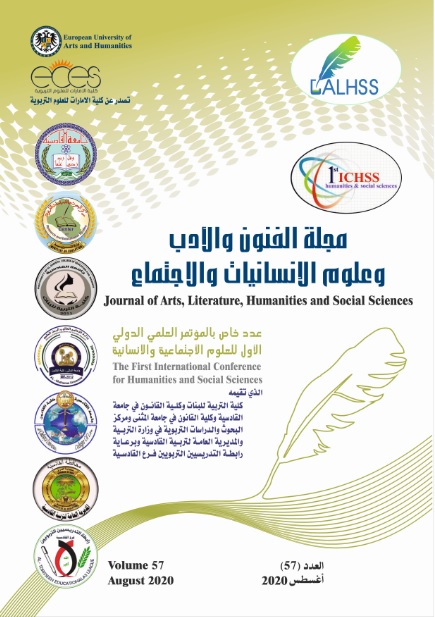The Effect of Information Technology on Social and Political Values in Iraq
Abstract
Modern electronic technology from social media, cyber power, modern technology, spider web, and others revolutionized the worlds of communication, communication, and information. They have strongly touched their social, cultural, and political values and intervened on a wide scale in changing political, social, economic, and security institutions and in manipulating the prevailing balance of power, and that their entry into society leads Inevitably to adjustments and effects in the value system, the scale of priorities, and changes in the degrees of values according to the degrees of interaction and the approach to dealing and adjustment that each society or family takes towards this For tools.
Perhaps the willingness of the administration based on that to extend its system of cultural and political values to the societies and peoples of other countries that specifically target the non-solid or so-called soft and soft groups, namely young people, students, women and children, to establish a generation subject to that administration or culture within these societies and the family through soft manipulation programs With cultural, social and political agendas, leading to smooth political and strategic transformations and coups, that achieve the desired goals set.
References
2. إبراهيم المبيضن، (5/1/2019) التكنولوجيا ووسائل الاتصالات الذكية تغير أسلوب حياتنا، الغد.
3. احمد الشايب، (17/1/2019) التقدم التكنولوجي في العصر الحديث، الالوكه اطلع عليه.
4. د. طاوس وازي و د. عادل يوسف، (2013) وسائل التكنولوجيا الحديثة وتأثيرها على الاتصال بين الإباء والابناء، قسم العلوم الاجتماعية، كلية العلوم الإنسانية والاجتماعية، جامعة قاصدي مرباح، بحث مقدم إلى الملتقى الوطني الثقافي، ص7.
5. نؤسس، المصدر أعلاه، ص 10.
6. مركز الحرب الناعمة للدراسات، (2016) شيكات التواصل الاجتماعي، الطبعة الاولى، بيروت، ص 95.
7. طاوس وازي وعادل يوسف، مصدر سبق ذكره، ص 9.
8. محمد جامعة الجلفة، (2017) شبكات التواصل الاجتماعي واشكالية التباعد الاسري، (دراسة حالة الاسرة الجزائرية)، الجزائر، ص13.
9. الهام العويض، (2012) وسائل التواص الاتصال الحديثة وتأثيرها على الاسر، مجلة (البيان)، العدد (13)، ص 26.
10. طاوس وازي وعادل يوسف، مصدر سبق ذكره، ص 3.
11. محمد جامعة الجلفة، مصدر سبق ذكره، ص 34.
12. مقالة تحت عنوان (صراع الجبابره) للكاتب فادي الطويل 2014 الرابط:
13. Httpi//www.assafir.com/Article
14. مركز الحرب الناعمة للدراسات، (2016)، شبكات التواصل الاجتماعي (لمحات للحرب الامريكية الناعمة) بيروت، الطبعة الاولى، ص 27.
15. علي أكبر احمد بان، (2013)، التهديدات الثلاثة وحركة تطورها، منشورات مركز قيم للدراسات الثقافية، الحرب الناعمة، بيروت، الطبعة الاولى، ص30.
16. مركز الحرب الناعمة للدراسات، المصدر سبق ذكره، ص 35.
17. نفس المصدر، ص 44.
18. حسن محمد الزين، (2016)، نحو استراتيجية إسلامية لمواجهة الحرب الناعمة، مقال منشور من سلسلة الندوات الفكرية الصادرة من مركز قيم للدراسات بيروت، الطبعة الاولى، ص 24.
19. مركز قسم الدراسات، الحرب الناعمة (قراءة في أساليب التهديد واوزان المواجهة) الطبعة الاولى، بيروت، 2013، ص 78.
20. محمد حمدان، القوة الناعمة وإدارة الصراع عن بعد، مركز حمرابي للبحوث والدراسات الاستراتيجية، الطبعة الاولى، العراق، 2013، ص71.
21. محمد حمدان، القوة وإدارة الصراع عن بعد، مصدر سبق ذكره، ص223.
22. نعيم قاسم، كيف نواجه الحرب الناعمة، مركز قيم للدراسات، لبنان -بيروت، 2012، ص43.
23. محمد حمدان، مصدر سبق ذكره، ص 272.
References
1. Izzat al-Sayyid Ahmad, (2013), the technological revolution and its effect on changing values, Damascus University Journal, No. (4 + 3) Volume (29), p. 477.
2. Ibrahim Al-Mobaideen, (5/1/2019) Technology and smart communication means changing our way of life tomorrow.
3. Ahmed Al-Shayeb, (17/1/2019) technological progress in the modern era, Al-Alokah viewed it.
4. Dr.. Taos Wazi and d. Adel Yusef, (2013) The Means of Modern Technology and its Impact on Communication between Parents and Children, Department of Social Sciences, Faculty of Humanities and Social Sciences, Qasdi Mirbah University, research presented to the National Cultural Forum, p. 7.
5. Founding, the source above, p. 10.
6. Soft War Center for Studies, (2016) Social Media Checks, First Edition, Beirut, p. 95.
7. Tawoos Wazi and Adel Youssef, previously mentioned source, p. 9.
8. Muhammad, University of Djelfa, (2017), social networks and the problem of family separation, (case study of the Algerian family), Algeria, p. 13.
9. Elham Al-Awad, (2012) modern means of communication and its impact on families, Al-Bayan, No. 13, p. 26.
10. Tawoos Wazi and Adel Youssef, previously mentioned source, p. 3.
11. Muhammad University of Jelfa, previously mentioned source, p. 34.
12. An article titled (Conflict of the Titans) by Fadi Al-Tawil 2014 Link:
13. Httpi // www.assafir.com / Article
14. Soft War Center for Studies, (2016), Social Networks (Profiles of the Soft American War) Beirut, First Edition, p. 27.
15. Ali Akbar Ahmed Ban, (2013), The Three Threats and Their Development Movement, Qayyim Center for Cultural Studies, Soft War, Beirut, First Edition, p. 30.
16. Soft War Center for Studies, the source previously mentioned, p. 35.
17. The same source, p. 44.
18. Hassan Muhammad Al-Zein, (2016), Toward an Islamic Strategy to Confront Soft War, published article from the series of intellectual seminars issued by the Qayyem Center for Studies in Beirut, first edition, p. 24.
19. Center for Studies Department, Soft War (Reading in Threat Methods and Weights of Confrontation), First Edition, Beirut, 2013, p. 78.
20. Muhammad Hamdan, Soft Power and Remote Conflict Management, Hamrabi Center for Research and Strategic Studies, First Edition, Iraq, 2013, p. 71.
21. Muhammad Hamdan, Power and Remote Conflict Management, aforementioned source, p. 223.
22. Naim Qassem, “How We Face Soft War,” Qayem Center for Studies, Lebanon-Beirut, 2012, p. 43.



